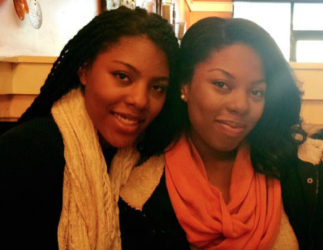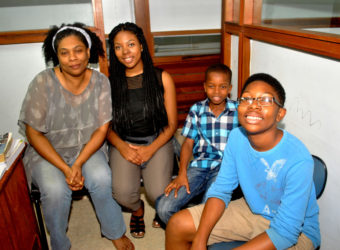By Ima Christian
In the Summer of 2014, my younger siblings and I developed an app called Five-O that allows citizens to rate, review and track their interactions with law enforcement. We received over 10,000 downloads within the first two weeks of making the app available for Android due to all of the national and international media attention we were receiving. We were doing up to 50 interviews a week within the first month of releasing the app—all while balancing school work, and, in my case, college applications. In December 2015, we competed in the international Innovating Justice Challenge at The Hague, Netherlands, where we won first place and €20,000 for our work on Five-O.

My parents, Karen Abrams and Leon Christian, planted the seeds of Science, Technology, Engineering and Math in my siblings and I from an early age when they exposed us to hands-on tools such as LEGO Mindstorm Robotics, a robot-building and programming kit; Scratch Programming, a free programming language where you can create your own interactive stories, games, and animations; as well as App Inventor, a visual, blocks language for building Android Apps. While my siblings and I continue to share our passion for Computer Science and technology through various community tech days in our hometown of Atlanta, GA, we felt a specific desire to give back to students in Guyana by creating our project, STEM Guyana, where our mission is to truly unleash the world-class potential of Guyana’s youth.
We plan on doing so by organizing and running multiple robot camps, ending in a final exhibit, open to the public, where students will come to build and exhibit their robots, as well as engage in friendly competition. In addition to this, we will be leasing robots and providing access to educational presentations and inspirational videos to future STEM club leaders in each of the locations across Guyana. We will also distribute shirts and other tech-related merchandise to our participants and volunteers. We want these robotics camps to be sustainable because our vision for STEM Guyana goes far beyond the camps we are hosting in the upcoming weeks.

These past few days, my mother, younger brother, and I, with the help of many amazing people in Guyana, have been training future STEM club leaders and student volunteers for the upcoming robotics camps. The experience for me has been quite inspiring and motivating. My responsibility is to introduce students and participants to LEGO Mindstorm Robotics by sharing a presentation on the basics of robot building and programming, and then leading them through the construction of two robots and multiple programs. The very first day, the future club organizers were responding so well to the curriculum, understanding everything extremely quickly, and most importantly, having fun. My only expectation was that the participants would grasp the information I was relaying, and be able to confidently replicate it, but what I found was beyond anything I could have hoped for.
The students, after understanding how to build and program the initial, simpler robots, would speed ahead of me and make their robots spin, turn, and make sounds! Some of the students, without any prompting, started trying to add more wheels to their robots and accomplished that successfully! I could see how students were using disciplines that they were familiar with to help them instruct the robot to act. Some students were employing various math concepts, some students were using their knowledge of physics to help them contemplate the robot’s arm motion. What astounded me was when I re-entered the robotics room, upon taking a lunch break, each of the students started building entirely new and improved, much more complex robots that they had found in the manual! The students were, on their first day of interacting with the robots, exhibiting excellent teamwork, superb critical-thinking skills, and awesome problem-solving and decision-making initiative. The enthusiasm in the room was palpable. To see how one team’s enthusiasm would spur another team’s excitement and how every student in the room was feeding off of the energy of their surroundings caused me such excitement.
The skills that the students are gaining from building and programming these robots are invaluable. Students are taking these skills—logic, problem-solving, teamwork, critical thinking and decision-making—and pairing them with disciplines they are already familiar with, physics, math, biology, chemistry, to become innovators and leaders.





